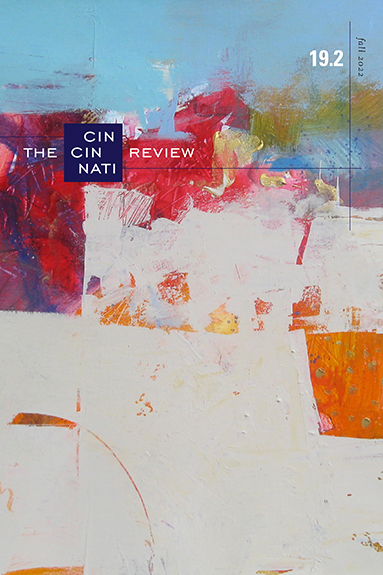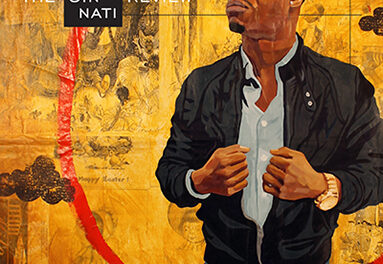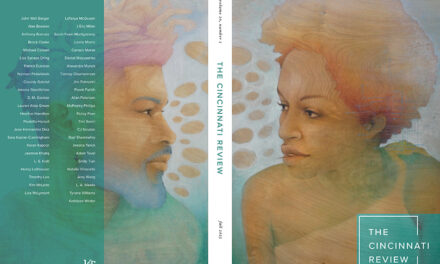It’s winter in the sturgeon-spearing capital of the world. Once again, there is justification for the expensive trucks parked in the driveways of crumbling lakeside houses, waiting to be turned over and driven out onto the ice. Standing on the lake, which you can barely see across, is like being on a planet people are futilely trying to settle with corrugated shacks. And there is something off about those fish, those million-year-old beasts, who you shared the lake with on summer swims. They lurked below as you cannonballed and sailor-dived. They are thorny, large, and old, crusted with dinosaur bumps. They look as if they could tear a person to bits, but your brother told you they are bottom-feeders. They eat muck and trash. Suck it from the lake floor like a vacuum. They swim to the surface only because they are curious about the dangling Bud Light can, the Bundt-cake mold, the musty old boot, the detached doorknobs that the fishermen place strategically in the light. Curious.
The department supervisor tells you to go out to the loading dock and organize the leftover Christmas items in the trailer. It’s a mess, frozen expired hams stacked too high to reach. You’re so tired you want to build a fortress around yourself and take a nap right on top of the free-range geese but decide to push through instead. You’ve worked every holiday for the last ten years, four a.m. to eleven. Holidays are what balance the books. You despise everything associated with Christmas: tinsel, lights in the park that you can tune your radio station to, the Salvation Army, frozen turkey giblets stuck to the insides of carcasses. You should be supervisor, but you passed up the promotion several times. To take your job seriously is to give up.
The back of the store is a maze: passageways lead from one department to the next, with stairways that lead to the second-floor observation deck, breakroom, bathrooms, etc. It’s a hive that people funnel in and out of, through automatic doors, to pick up cocktail weenies and brandy. As you pass by reception, you give the boys stacking pallets a dirty look and push a stray shopping cart in their direction. Everyone else dislikes you meat guys. They think you are a bunch of antisocial jerk-offs. You find this observation fairly accurate.
Your brother volunteers with the firefighters every sturgeon season. He used to teach college science, the basics, up the road. He looks like Richard Dreyfuss in Jaws. He looks like he belongs on the lake, hanging over the edge, chumming the waters. There is a road on the lake, with cracks and thin ice flagged with dead Christmas trees. Last year, like most, the markers were ignored, and a truck took the dive. This happens a lot. Drinking is half the culture. Except that time, there were two little kids in the back seat. A son and a daughter. Your brother was one of the divers they sent down. He tells stories about how he didn’t want to reach in and unbuckle them because they already looked buried down there at the bottom of the frozen lake. He told you how one of the prehistoric creatures swam past the windshield as if mocking the dead man floating in the driver’s seat, then disappeared into the brown murk. He acts as if you’re his private counselor.
Your first day on the job reminded you of walking out onto that lake, in the cooler or out front in the refrigerated open workspace, and you cursed the job and the water soaking through your shoes because your work boots hadn’t shown up yet. Back then, you were freezing, but now you are used to it, don’t notice it at all.
You turn to the meat guy standing next to you and say, “Toad, come look at this.”
“I’ve seen that before. Cut off a chunk and try to save it.” He sounds excited and entertained, like a destructive little boy. “Yuck, yuck, yuck,” he says, stamping his feet.
You bend the loin back into a horseshoe and watch the pus ooze out from where the bone touches the meat. It comes out in an almost-perfect cylinder, like a black-snake firework, the kind you used to ruin the driveway with as a kid. Toad comes over, sticks his finger into the hole, and corkscrews it, laughing.
“Filthy beasts,” he says.
You save what you can and throw the rest in the trash. You unplug the band saw and begin to spray off the bone dust that gobs onto the blade and falls to the bottom. You spray the floors, washing away the blood under Toad’s workstation, and the mixture runs into the sewer grates behind the display case. You spray the back of Toad’s work boots.
“Hey, watch it,” he grunts.
In another lifetime, Toad would be raping and pillaging, setting fire to thatched dwellings. He’s a compact bundle of rage. Under his whites he is tattooed across the arms and neck, iron crosses, spiderwebs. He’s a short man, a metal drummer who (like all drummers) has an uncommunicative energy, one he beats into his set in his sister’s basement every day when he gets home. He reminds your supervisor of Battletoads, with their bulging traps and steel-toed boots. He has a tattoo of a sturgeon in the middle of his chest, but he hasn’t seen one swim past his hole even once, though he knows plenty of people who have. You spray his feet again, and he chucks his knife into the sink, then heads into the cooler. Many of the employees who work at Westrow for short stints, summer jobs or part-time on their way to something better, find it best to keep their distance from Toad, but you find his cartoonish masculinity entertaining, a walking, talking Popeye.
In your brother’s home office is a large file cabinet with hundreds of microscope slides. A student from the community college comes over once a week and helps him catalog these online. Research was once his baby, before his students became his babies. He doesn’t want you going through the slides and mucking up his order, so you just watch. Since the accident, your brother is primarily concerned with microbial communities within Lake Sturgeon and has asked several fishermen for the soupy mud they’ll pull out of the fish this year. The last time you saw him, he said that the oldest fish caught in the lake was 125 years old and 240 pounds. “Think about it,” he said, “Benjamin Harrison was president.” As his private counselor, you advised him that this was becoming an unhealthy obsession, possibly a by-product of grief. When he didn’t return to teaching this year, you felt then, as you feel now, that you’re both sliding into the same hole, the one you assumed he’d crawled out of years ago, through education and better looks. You were under the impression that he maintained his taxonomy project because of nostalgia, science, or both. “Teaching kids how to use Bunsen burners isn’t all that thrilling,” he’d said. Now you are both back where you started.
. . .










